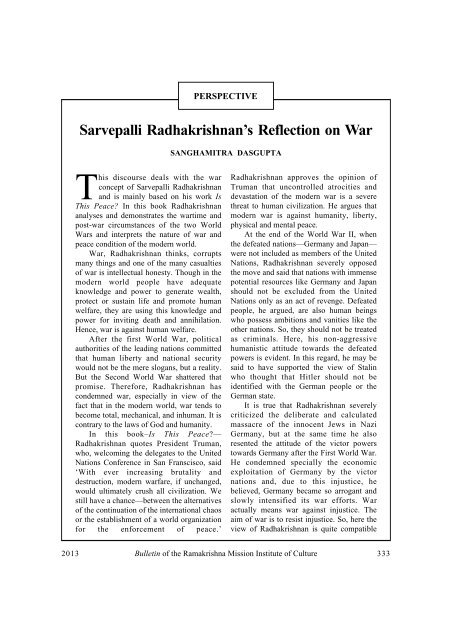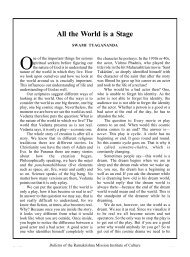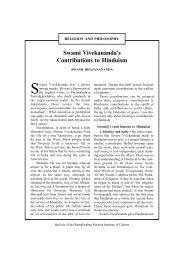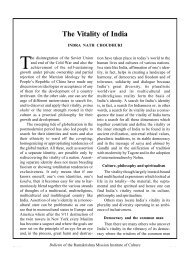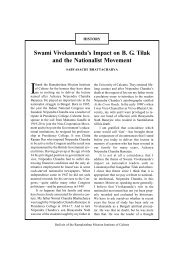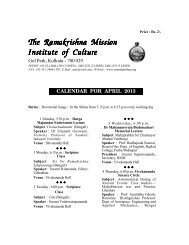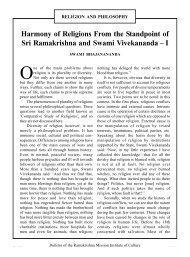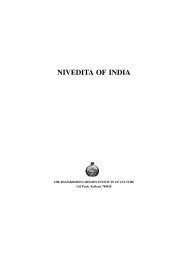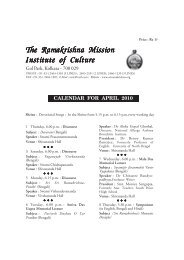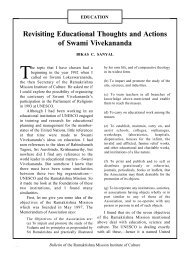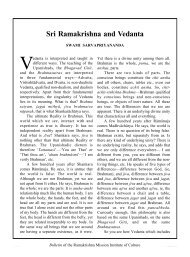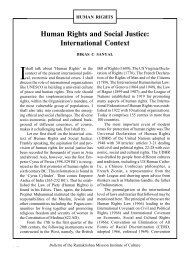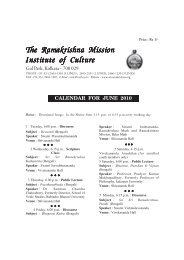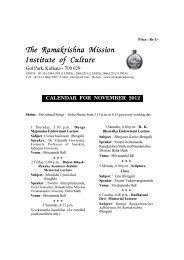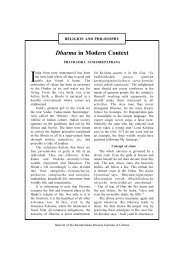Bulletin Monthly Sample July 2013 - Ramakrishna Mission Institute ...
Bulletin Monthly Sample July 2013 - Ramakrishna Mission Institute ...
Bulletin Monthly Sample July 2013 - Ramakrishna Mission Institute ...
You also want an ePaper? Increase the reach of your titles
YUMPU automatically turns print PDFs into web optimized ePapers that Google loves.
SARVEPALLI RADHAKRISHNAN’S REFLECTION ON WAR<br />
PERSPECTIVE<br />
Sarvepalli Radhakrishnan’s Reflection on War<br />
SANGHAMITRA DASGUPTA<br />
This discourse deals with the war<br />
concept of Sarvepalli Radhakrishnan<br />
and is mainly based on his work Is<br />
This Peace? In this book Radhakrishnan<br />
analyses and demonstrates the wartime and<br />
post-war circumstances of the two World<br />
Wars and interprets the nature of war and<br />
peace condition of the modern world.<br />
War, Radhakrishnan thinks, corrupts<br />
many things and one of the many casualties<br />
of war is intellectual honesty. Though in the<br />
modern world people have adequate<br />
knowledge and power to generate wealth,<br />
protect or sustain life and promote human<br />
welfare, they are using this knowledge and<br />
power for inviting death and annihilation.<br />
Hence, war is against human welfare.<br />
After the first World War, political<br />
authorities of the leading nations committed<br />
that human liberty and national security<br />
would not be the mere slogans, but a reality.<br />
But the Second World War shattered that<br />
promise. Therefore, Radhakrishnan has<br />
condemned war, especially in view of the<br />
fact that in the modern world, war tends to<br />
become total, mechanical, and inhuman. It is<br />
contrary to the laws of God and humanity.<br />
In this book–Is This Peace?—<br />
Radhakrishnan quotes President Truman,<br />
who, welcoming the delegates to the United<br />
Nations Conference in San Franscisco, said<br />
‘With ever increasing brutality and<br />
destruction, modern warfare, if unchanged,<br />
would ultimately crush all civilization. We<br />
still have a chance—between the alternatives<br />
of the continuation of the international chaos<br />
or the establishment of a world organization<br />
for the enforcement of peace.’<br />
Radhakrishnan approves the opinion of<br />
Truman that uncontrolled atrocities and<br />
devastation of the modern war is a severe<br />
threat to human civilization. He argues that<br />
modern war is against humanity, liberty,<br />
physical and mental peace.<br />
At the end of the World War II, when<br />
the defeated nations—Germany and Japan—<br />
were not included as members of the United<br />
Nations, Radhakrishnan severely opposed<br />
the move and said that nations with immense<br />
potential resources like Germany and Japan<br />
should not be excluded from the United<br />
Nations only as an act of revenge. Defeated<br />
people, he argued, are also human beings<br />
who possess ambitions and vanities like the<br />
other nations. So, they should not be treated<br />
as criminals. Here, his non-aggressive<br />
humanistic attitude towards the defeated<br />
powers is evident. In this regard, he may be<br />
said to have supported the view of Stalin<br />
who thought that Hitler should not be<br />
identified with the German people or the<br />
German state.<br />
It is true that Radhakrishnan severely<br />
criticized the deliberate and calculated<br />
massacre of the innocent Jews in Nazi<br />
Germany, but at the same time he also<br />
resented the attitude of the victor powers<br />
towards Germany after the First World War.<br />
He condemned specially the economic<br />
exploitation of Germany by the victor<br />
nations and, due to this injustice, he<br />
believed, Germany became so arrogant and<br />
slowly intensified its war efforts. War<br />
actually means war against injustice. The<br />
aim of war is to resist injustice. So, here the<br />
view of Radhakrishnan is quite compatible<br />
<strong>2013</strong> <strong>Bulletin</strong> of the <strong>Ramakrishna</strong> <strong>Mission</strong> <strong>Institute</strong> of Culture<br />
333
SANGHAMITRA DASGUPTA<br />
with the traditional Indian concept of affinity<br />
and concern for the defeated nations.<br />
Japan was the ally of Britain and France<br />
in the First World War. As a consequence<br />
of this, when Japan invaded Manchuria<br />
and Korea and attacked China, neither<br />
Britain nor France, ie no big powers of the<br />
world, condemned and opposed this<br />
aggressive attitude of Japan which<br />
was contrary to the international law.<br />
This view of Radhakrishnan delineates<br />
international consciousness which considers<br />
that aggression is inconsistent with peace<br />
and harmony.<br />
Again, the Western democratic powers<br />
did not oppose the aggression of Germany,<br />
Italy and Japan and they remained<br />
completely indifferent as mere observers<br />
until Poland was attacked by Germany.<br />
Radhakrishnan criticized this narrow, selfish<br />
nationalism of the European big powers<br />
which did not show any respect for<br />
international laws and paved the way for<br />
another World War.<br />
Radhakrishnan also denounced the<br />
implementation of the ‘flying bomb’ by<br />
Germany and also the use of atomic power<br />
by the Allied Nations, because all these were<br />
against the principle of humanity. Here,<br />
again, his view was non-aggressive and<br />
humanistic. In the Second World War, no<br />
poison gas was used, not because of ethical<br />
considerations, but due to the fear of reprisal.<br />
Every nation knew that the opponent state<br />
also possessed poison gas and they might<br />
apply it. But in the case of atomic bomb, as<br />
the Axis Powers did not have it, the Allied<br />
powers could quite comfortably use it<br />
without any fear of retaliation. Here,<br />
Radhakrishnan uncovered a pragmatic aspect<br />
of war—that method of war should be<br />
adopted after a clear analysis of the<br />
capability of the enemy states. Moreover, he<br />
makes a distinction between war and<br />
massacre. Attack on unarmed civilians is not<br />
war, but simply killing is completely<br />
immoral. So, he always stressed the<br />
implementation of humanistic norms in war.<br />
The Allied Powers justified the use of<br />
atomic bomb on the ground that it shortened<br />
the duration of war. Radhakrishnan opined<br />
that this cannot be a justification for the use<br />
of such an immensely destructive weapon.<br />
Nations engaged in war consider the enemy<br />
states as demon and try to treat them in a<br />
brutal manner. But Radhakrishnan said this<br />
should not be the attitude of the civilized<br />
world; there must be a humanistic approach.<br />
He closely observed that the Allied Powers<br />
were not severely condemned for this use of<br />
the nuclear bomb though it clearly violated<br />
international law and morality and the sole<br />
justification for its use could be nothing<br />
except military necessity. Here, he expressed<br />
a very pragmatic view and recognized the<br />
significant role of morality even in war. He<br />
pinpointed that even military necessity<br />
cannot be an adequate ground for the use of<br />
atomic bomb.<br />
While discussing the decision of the<br />
War Crimes Commission after the Second<br />
World War, he agreed with the Commission<br />
that demolition of cities and civilians (eg.,<br />
Hiroshima and Nagasaki) was a serious war<br />
crime. He repeatedly condemned the<br />
aggressive elements of war, laid stress on the<br />
humanistic aspect and opined that no<br />
unethical warlike skill or military ploy was<br />
right for the attainment of victory. War<br />
should be a fair fight and devoid of mass<br />
murder. To avoid injustice, a selfexamination<br />
is required before delivering<br />
justice or giving retribution. Here,<br />
Radhakrishnan gave his exposé of the postwar<br />
attitude towards the war criminals and<br />
held the view that war itself was a crime<br />
which was the fusion of all crimes. War may<br />
be started for a noble purpose, to fight the<br />
evil and brute forces, injustice and<br />
exploitation; but if that war ultimately goes<br />
334 <strong>Bulletin</strong> of the <strong>Ramakrishna</strong> <strong>Mission</strong> <strong>Institute</strong> of Culture<br />
<strong>July</strong>
SARVEPALLI RADHAKRISHNAN’S REFLECTION ON WAR<br />
against human and civilized values then its<br />
purpose gets scotched.<br />
Radhakrishnan further believed that the<br />
Allied Powers became victorious in the<br />
Second World War not for their love of<br />
freedom or morality, but for their physical<br />
power, superior scientific techniques, stable<br />
economy and a strong determination to<br />
defeat the opponent by any means. This<br />
victory was not so glorious in the eyes of<br />
Radhakrishnan as it completely lacked<br />
fairness and any assertive ethical element.<br />
Radhakrishnan maintained that the<br />
defeated powers should be treated<br />
with consideration, sympathy and goodwill<br />
because faith and understanding can<br />
only build a better world. The conquerors,<br />
he argued, should provide economic<br />
and political securities to the vanquished<br />
nations. Thus he was dead against<br />
narrow nationalism and vindictive conduct<br />
that give rise to future war. This assertion<br />
reveals his great concern about global peace<br />
and harmony.<br />
Radhakrishnan warned us against<br />
narrow nationalism. One cannot be a true<br />
patriot, he believed, without a genuine love<br />
for humanity. For this reason, nations should<br />
consider the interest of the entire world<br />
while safeguarding their own national<br />
interests. He recommended that an<br />
international organization should look after<br />
world peace. This advocacy reflected his<br />
international awareness.<br />
In the Security Council of the United<br />
Nations, formed after the Second World<br />
War, representatives were selected on the<br />
basis of power. Radhakrishnan then raised<br />
the question regarding the true nature of the<br />
power and said that it was difficult to define<br />
this power. For, if territorial extent,<br />
strategical situation, self-sufficiency in<br />
agricultural, industrial and mineral resources<br />
were considered to be the criteria of being<br />
labelled a power, then India should be<br />
regarded as one of the great powers of the<br />
world which was quite capable of looking<br />
after world peace. But the selection of the<br />
representatives in the Security Council, he<br />
thought, indicated a very unusual power<br />
concept of the modern world. He observed<br />
that the structure of the United Nations was<br />
such that it could oppose the aggression of<br />
the small powers but not of the big powers.<br />
If this power concept was accurate, fair and<br />
ethical, then there would be no aggression,<br />
for powerful states will have a sympathy and<br />
consideration for the rights of the less<br />
powerful nations. As this is not the real<br />
picture, antagonistic attitude exists.<br />
Radhakrishnan noticed that in the<br />
contemporary world aggression was related<br />
to the imperfect notion of power.<br />
He was of the view that the big powers<br />
should be self-restrained for the sake of<br />
world peace. If there is no self-restraint,<br />
every nation would try to be more powerful<br />
than others and it will attack other countries.<br />
Aggression and war will be the inevitable<br />
consequences of such unrestricted desires<br />
and passions. Hence, to prevent aggression<br />
and war, nations must restrict their desires of<br />
being more powerful. In this case, he upheld<br />
the ancient Indian ethos.<br />
Radhakrishnan also noted that the<br />
feeling of danger brought the great powers<br />
together and when that feeling disappeared<br />
their unity slackened. Obviously, the<br />
intention behind their operation was to<br />
protect their own interests and not world<br />
peace. The ancient Indian epic like the<br />
Mahàbhàrata shows that different states<br />
usually get united for fighting a war. But in<br />
those days that union not only sought to<br />
protect the interest of the nations but also to<br />
preserve ‘dharma’ by resisting injustice and<br />
evil. There lies a colossal difference between<br />
the ethical perspective of ancient India and<br />
the modern approach of big powers.<br />
Radhakrishnan noted another striking<br />
<strong>2013</strong> <strong>Bulletin</strong> of the <strong>Ramakrishna</strong> <strong>Mission</strong> <strong>Institute</strong> of Culture<br />
335
SANGHAMITRA DASGUPTA<br />
difference between these two perspectives.<br />
He points out that the ancient Indian view<br />
was that a king got involved in a war only to<br />
make his state prosperous, for prosperity and<br />
resources were required for the well-being of<br />
the state. But modern world believes that a<br />
country, which is economically very much<br />
powerful, may have aggressive attitude and<br />
it can endanger the security of other nations.<br />
Ancient view held that a state could attack<br />
other states and get involved in a war for a<br />
national cause, though war had always been<br />
considered as the last resort by the ancient<br />
authorities. But in the present-day world an<br />
economically powerful state is not satisfied<br />
only with its own prosperity and<br />
development, rather it aspires to be more and<br />
more powerful and, in the process, wages an<br />
aggressive war.<br />
As a post-war policy concerning<br />
the maintenance of the world peace,<br />
the great powers strove for the possession of<br />
the strategically significant places, and<br />
America, Britain and other big powers were<br />
not simply interested in the proposal<br />
of giving independence to the people of<br />
their colonies. They thought that would<br />
geopardize global peace.<br />
So, the contemporary world conceives<br />
that in the interest of world peace economic<br />
power, military bases, and control of the<br />
other nations are inevitable. It means that<br />
world peace depends on the supremacy and<br />
hegemony of the big powers over the small<br />
ones. Radhakrishnan dubbed such thinking<br />
military imperialism which can never bring<br />
durable peace because the subjugated<br />
colonized countries are bound to fight for<br />
their independence sooner or later.<br />
Though Radhakrishnan gave maximum<br />
stress on world peace, he was aware of the<br />
fact that war cannot be absolutely<br />
obliterated. However, he felt strongly that<br />
aggressive wars should be prevented by<br />
minimizing the conflicting elements. And,<br />
for that purpose, an international<br />
organization approved by the entire world is<br />
to be established which will have the<br />
authority to declare war only against<br />
aggressive nations.<br />
Radhakrishnan came to the conclusion<br />
that treaties, settlements, and alliances are<br />
not adequate instruments to assure peace, for<br />
they are concerned only with the existing<br />
causes of war and not with the root of the<br />
problem. The real causes of conflict are the<br />
competitive ways of life of the present-day<br />
society, national and class divisions, racial<br />
and religious differences. Mere treaties and<br />
settlements cannot alter all these facts of life,<br />
hence war is a practical reality which cannot<br />
be totally eliminated. Nevertheless, his<br />
proposition is that war must be nonaggressive<br />
as far as possible.<br />
In his article ‘Mahatma Gandhi’<br />
Radhakrishnan comments that government<br />
and power, and not the common people, are<br />
responsible for modern war. The ruling class<br />
stokes up the fear, self-interest and pride of<br />
the common people and seduces them into<br />
standing behind its anti-human activities.<br />
Thus we find that Radhakrishnan’s view<br />
on war is quite compatible with the Indian<br />
tradition which holds that the existence<br />
of war is a fact, but its aggressive teeth<br />
have to be blunted. War must have a moral<br />
aspect, it should be backed up by humanistic<br />
elements. Non-violence, as an ideal is<br />
no doubt praiseworthy, but violence is a<br />
reality in this world. So, war is. We<br />
must only make an honest endeavour to<br />
make it non-aggressive. •<br />
* Dr Sanghamitra Dasgupta is an Assistant Professor in the Department of Philosophy, Maulana<br />
Azad College, Kolkata.<br />
336 <strong>Bulletin</strong> of the <strong>Ramakrishna</strong> <strong>Mission</strong> <strong>Institute</strong> of Culture<br />
<strong>July</strong>


